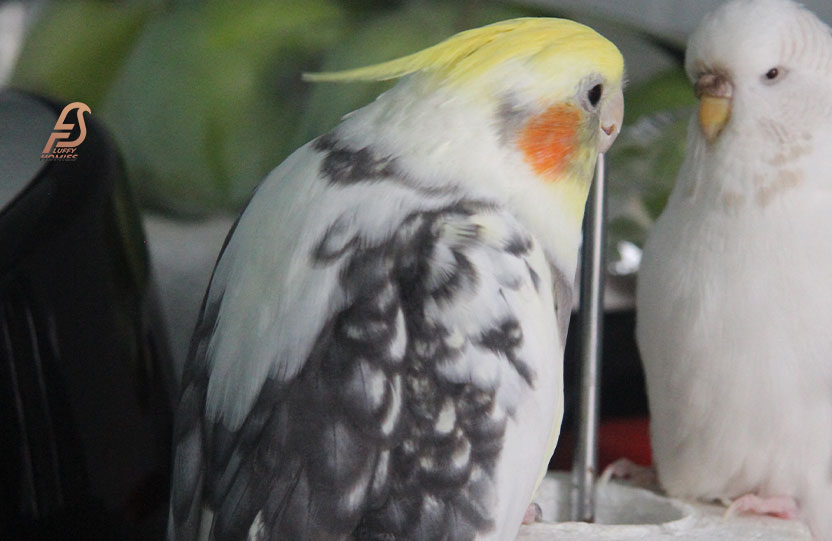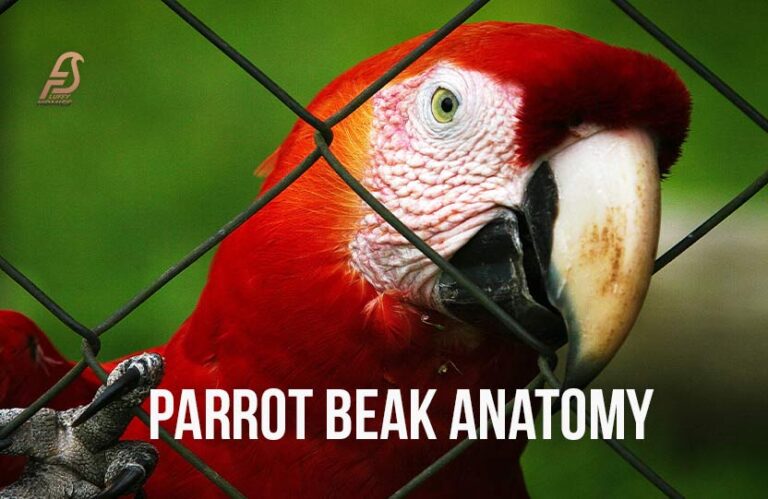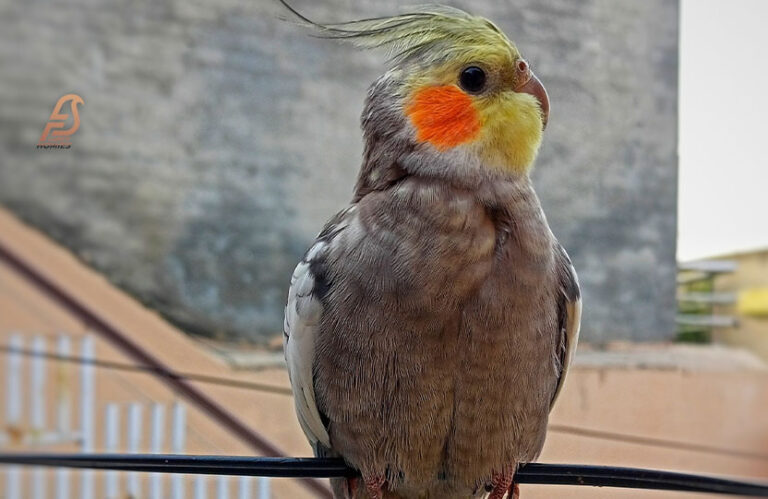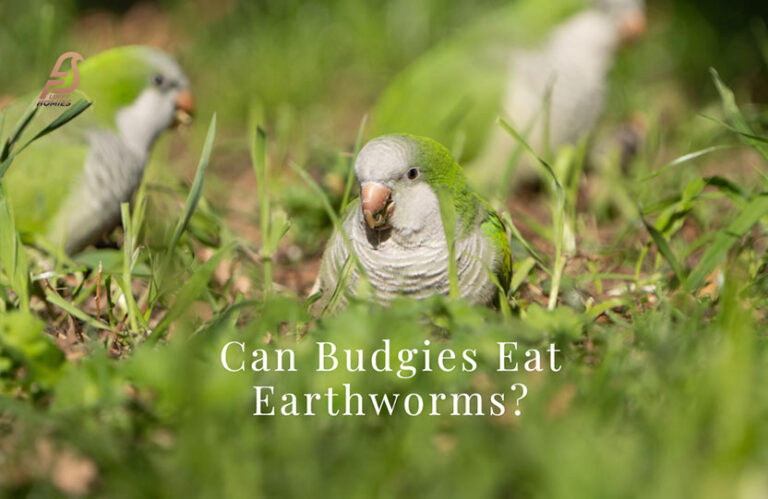Wings of Worry: Understanding Fast Breathing in Cockatiels
Having birds as a pet is a beautiful thing. But there are also many things you have to check on a daily or weekly basis for the sake of their good health. Due to bad health some cockatiels stop eating food.
Because some reasons like bad food, toxic chemicals, or any other factor make them ill and as quickly as they can cure it.
Some people have a question is there my cockatiel breathing fast? They also asked why is my cockatiel breathing fast.
Why Is My Cockatiel Breathing Fast & How to Fix It?
Stress or Anxiety
Stress or anxiety can be caused by a cockatiel breathing fast. Cockatiels may become stressed or anxious for a variety of reasons, such as being in a new environment, being around unfamiliar people or animals, or experiencing a change in routine.
When a cockatiel is stressed or anxious, its body may release hormones that can increase its heart rate and cause them to breathe faster.
Due to stress cockatiels also flapping their wings and attack their owners and this is a serious situation in which keeps them calm and stress free.
How to Fix Stress or Anxiety Problem in Cockatiels?
If you think that stress or anxiety may be causing your cockatiel to breathe fast, there are a few things you can try to help reduce their stress levels:
- Make sure your cockatiel has a quiet, peaceful place to rest and relax.
- Try to keep the environment around your cockatiel as consistent as possible, and avoid making sudden loud noises or movements.
- Bonding with your cockatiel can help reduce their stress and anxiety levels.
- Providing your cockatiel with toys and other activities can help keep them entertained and reduce boredom, which can help reduce stress.
Overheating
Overheating can be a cause of a cockatiel breathing fast. If a cockatiel becomes too hot, it may pant or breathe fast in an attempt to cool down and cockatiels starting to hate you. This is a natural response that helps regulate their body temperature.
How to Fix Overheating Problem in Cockatiels?
There are several things you can do to help prevent overheating in your cockatiel:
- Make sure your cockatiel has access to clean, fresh water at all times.
- Avoid placing your cockatiel’s cage in direct sunlight or in a location that is prone to overheating.
- A fan can help circulate air and keep your cockatiel cool.
- Providing your cockatiel with toys that can be chilled in the refrigerator, such as a block of ice or frozen fruit, can help keep them cool.
Heart Disease
Heart disease can be a cause of a cockatiel breathing fast. If a cockatiel has heart disease, it may have difficulty breathing and may breathe faster than normal. Other signs of heart disease in cockatiels may include lethargy, poor appetite, and difficulty flying.
Heart disease in cockatiels can be caused by a variety of factors, including genetics, poor nutrition, and high levels of stress or anxiety.
If you suspect that your cockatiel may have heart disease, it is important to consult with a veterinarian as soon as possible. They can assess your cockatiel’s health and provide you with guidance on how to best care for your bird.
How to Fix Heart Disease Problem in Cockatiels?
If your cockatiel is diagnosed with heart disease, your veterinarian may recommend medications, dietary changes, and other treatments to help manage the condition.
By following your veterinarian’s recommendations, you can help your cockatiel lead a happy, healthy life.
Infection or Illness
Infection or illness can be caused by a cockatiel breathing fast. If a cockatiel is sick or has an infection, its body may produce inflammation and other chemicals that can increase its heart rate and cause them to breathe faster. In that case cockatiels also grinding their beaks and may get hurt.
There are a variety of infections and illnesses that can affect cockatiels, including respiratory infections, fungal infections, and parasites.
Signs of infection or illness in cockatiels may include coughing, sneezing, nasal discharge, lethargy, and poor appetite.
How to Fix Infection or Illness Problems in Cockatiels?
It’s crucial to contact a veterinarian as soon as you can if you think your cockatiel might be ill or infected. They can evaluate your cockatiel’s health and give you advice on how to take the best care of your pet.
By keeping your cockatiel’s environment clean and providing them with a balanced diet, you can help reduce their risk of infection and illness. It is also a good idea to have your cockatiel vaccinated to help protect them from certain diseases.
What Signs Will My Cockatiel Show When They Have Trouble Breathing?
You should know something about your loving friend such as are my bird crying, can cockatiel get overweight, and more. If a cockatiel is having trouble breathing, it may show some signs, including:
Rapid breathing with Their Mouth
Rapid breathing with their mouth open is a sign that a cockatiel may be having trouble breathing. Cockatiels may breathe faster than normal if they are feeling stressed or anxious, if they are sick or have an infection, if they have heart disease, or if they are overheated.
Panting
Panting is a natural response that helps regulate body temperature and is often seen in birds that are overheated or stressed. Some peoples don’t know if there birds are molting or sick that make the situation more dangerous.
However, if a cockatiel is panting excessively or if they are panting and showing other signs of respiratory distress, it may be a sign that they are having trouble breathing.
Nasal discharge
Nasal discharge is a sign that a cockatiel may be having trouble breathing. If a cockatiel has a respiratory infection or another respiratory condition, it may have nasal discharge or crusty nostrils.
Coughing or sneezing
A cockatiel may be having respiratory difficulties if it is coughing or sneezing. A cockatiel may cough or sneeze more frequently than usual if it has a respiratory infection or another respiratory illness.
Lethargy
A cockatiel’s lethargy could indicate respiratory problems. A cockatiel may act less animatedly than usual and may appear exhausted or weak if they are experiencing trouble breathing.
How Fast Should a Bird Be Breathing?
A bird’s natural breathing rate varies depending on its size and amount of activity. Normal adult bird breathing rates range from 10 to 40 times per minute.
It’s important to keep in mind, though, that this can vary based on the particular bird and its surroundings.
You should keep a close eye on your bird’s respiratory rate and consult your veterinarian if you have any concerns. They may assess your bird’s health and offer you guidance on what’s common for that specific bird.
Will My Cockatiel Pant?
Yes, it is common for cockatiels to pant or breathe via their open mouths in specific situations. In birds who are overheated or anxious, panting is a common natural response that helps regulate body temperature.
A cockatiel may be having problems breathing if they are panting excessively or if they are doing so along with other symptoms of respiratory distress.
Why Is My Cockatiel Breathing Fast—Final Thoughts
A cockatiel’s fast breathing could be caused by some different factors. Fast breathing in cockatiels may be brought on by stress or worry, illness or infection, heart condition, or overheating.
It’s crucial to pay special attention to your cockatiel’s respiration if you notice it’s quick, and you should try to figure out what’s causing it.
A veterinarian should be consulted if the pet continues to breathe quickly or exhibits any other unusual behavior.
They will be able to evaluate your cockatiel’s health and provide you with advice on how to take care of your pet bird. To maintain your pet’s well-being, it’s crucial to take care of any underlying health issues as soon as possible.
FAQs
Why is my bird heart beating so fast?
There are several potential reasons why a bird’s heart may beat fast. Stress or anxiety, infection or illness, heart disease, and overheating are all potential causes of a fast heart rate in birds.
How do birds get enough oxygen?
Birds get enough oxygen by breathing through their lungs, which are located in the chest. When a bird breathes in, air enters its lungs and passes over the tiny blood vessels called capillaries. Oxygen from the air is then absorbed into the bloodstream and carried to the body’s cells. At the same time, carbon dioxide, a waste product of metabolism, is exhaled out of the body.
How long do cockatiels live?
Cockatiels can live for up to 20 years with proper care. Factors that can impact a cockatiel’s lifespan include its diet, living environment, and overall health.
What are the symptoms of bird flu in a bird?
The symptoms of bird flu (avian influenza) in birds can include fever, coughing, sneezing, nasal discharge, swelling of the head and neck, weakness, and lethargy. Some birds may also experience difficulty breathing, diarrhea, and a drop in egg production.
Why is my bird breathing so hard?
“A bird with higher respiratory effort often shows an up and down bob of its tail with each breath,” according to the researcher. Birds with infections in the lungs or air sacs may have breathing problems. Others will sneeze, wheeze, cough, and have nasal discharge, and some birds with respiratory diseases will have wet eyes.






